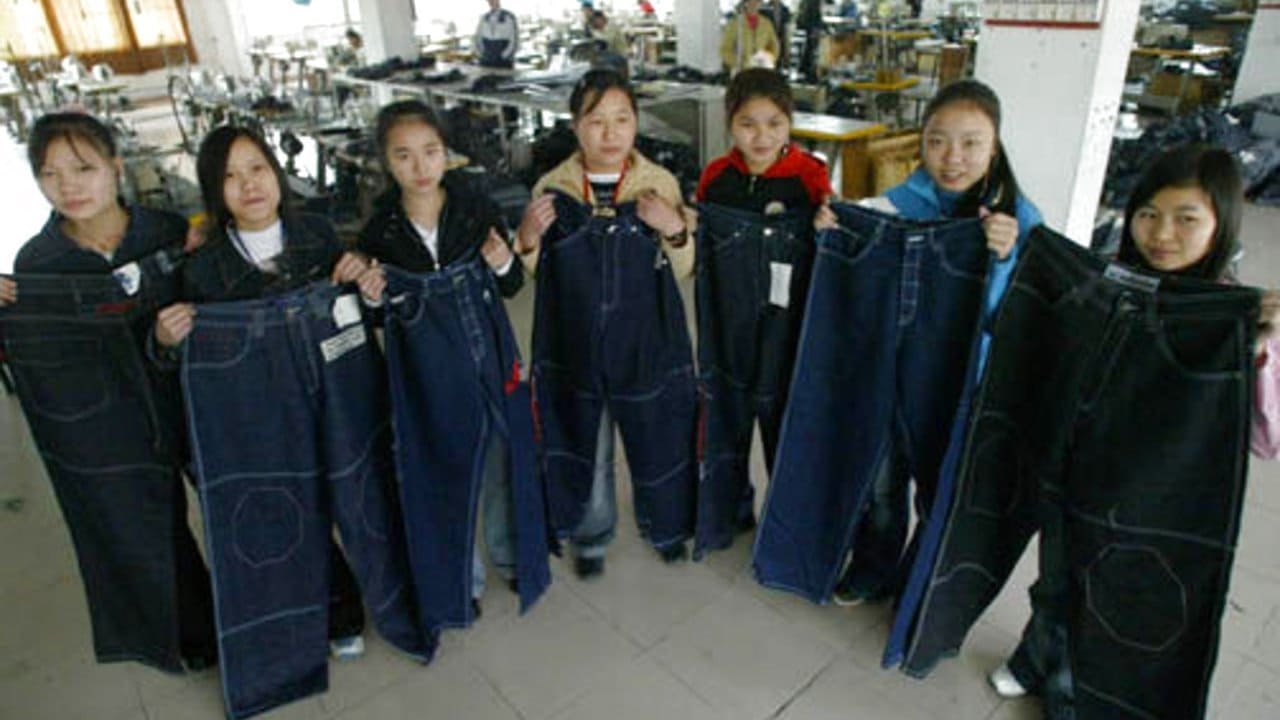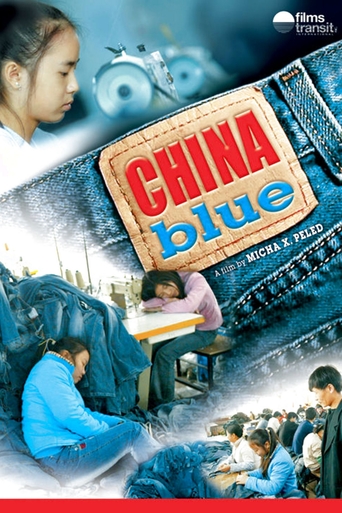

Sadly Over-hyped
... View MoreA brilliant film that helped define a genre
... View Moreif their story seems completely bonkers, almost like a feverish work of fiction, you ain't heard nothing yet.
... View MoreBy the time the dramatic fireworks start popping off, each one feels earned.
... View MoreCHINA BLUE, which examines the harsh reality of mass production of blue jeans in China's garment factories - jeans that are ultimately sold in America - is an amazing, insightful and profoundly moving film. It follows some of the young girls who find their way to the factories to get menial, slave labor jobs, then struggle to survive in the terribly harsh conditions that would be criminal in this country. The use of something very close to a dramatic structure, more typical of feature films, which weaves seamlessly with the documentary exploration, creates a new approach that tells the story with amazing power and involves the viewer completely. The surprise ending was so human, so unexpected, and so filled with hope. I kept thinking that someone or something might come to rescue the factory girls as a result. My mind constructed various possible scenarios of what might happen, but the truth is that the film itself may be what saves them, by bringing their plight to the attention of Western consumers who, it is hoped, will be outraged by the indentured servitude forced upon these young girls, and be unable to ignore the fact that their clothing purchases contribute to such misery and injustice. Shot over a 3-year period, often with an undercover camera smuggled into the Chinese factory, the terrible slave labor conditions endured by a small army of teenage girls is revealed. Through an accident of birth these young workers were born into abject poverty in rural Chinese villages. To try for a chance at a better life and to be able to send a little money back home to their starving families, they make the long and arduous journey to the factory towns, where they work under impossible conditions for a few cents an hour. If they had been born in America they would be attending school, listening to music, partying with their friends, attending sports events, thinking about their hair, makeup and boyfriends - just being normal teenage girls. But as Chinese factory workers with not even enough time to sleep well between excruciatingly long shifts, their lives are an endless drudgery and their teen years are stolen from them. When evaluating a film I want to see how long it stays with me, and this film and the situation that these young girls live in, with no chance of escape, has stayed with me ever since I saw it. I just can't get them out of my head. Their youth is being stolen from them and they are forced into a brutal and inhuman system that rejects their rights and their humanity. Hopefully the spotlight that CHINA BLUE shines on these injustices will lead to real changes. There is plenty of blame to go around for this outrage. In addition to the manufacturers who out-source the clothing production to China and call for ever-lower prices and ever faster delivery, the big stores who retail these jeans are guilty too. If only the labels and the retailers in the western world who contract with the Chinese factories would insist on dealing solely with factories that guarantee fair pay and humane working conditions, this form of slavery would be eliminated in short order. All they would have to do is be just a tiny bit less greedy, and give up just a little of their considerable profit. -- Review by Karil DanielsMicha X. Peled - Producer/Director/CameraSong Chen - Associate Producer/Translation Supervisor/Sound/Hidden Camera
... View MoreI watched China Blue with mixed emotions of anger,sadness,despair and even some guilt.Its a film that every Western consumer must see.Its gives a great insight into the sweatshops and the harsh lives of the young sweatshops workers that make our goods.Some of the workers(or slaves)would be classed as children in our society.It's a hard piece of viewing but I think it must be viewed by anyone that wears clothes.I couldn't get Little Jasmine(the main focus of the film)out of my head for days after viewing.She and her co-workers work around the clock to meet deadlines for Western company's and often don't get paid.They are treated like trash by management and often made wear pegs on there eyes to keep them awake.It brings home the point of capitalism's over production in one part of our world and extreme poverty in the other.The film makers done an excellent job in exposing this kind of human cruelty.
... View MoreThe extraordinary patience and perseverance of Micha Peled, against much Chinese obstruction, rewards us with appalling insights to the world of cheap labour exploitation in China. The near slavery of the young garment workers shames our own cushy lives and reveals the darkest side of international trade. No one should buy a pair of cheap fashion jeans ever again without knowing what China Blue reveals went into making them for the price.See the film and understand the ruthless modern world. Raise your voice if you can for workers rights in China. (Check out 'Labour behind the Label'). Above all remember that many people have suffered to provide you and me with a bargain. John Dollar
... View MoreWhen the balance of global power shifts, changing the world as we know it, it can be hard to fully reconstruct the historical realities. Today, the emergence of powerful industrial economies in countries that can become superpowers is barely understood. In 2005, The Economist newspaper ran an article entitled, 'How China runs the World Economy', and has recently acknowledged that China's GDP will overtake the USA within 40 years. The exact mechanism is shown in stark terms in China Blue, a mechanism with which the West cannot compete. But this is not a political film, it is a documentary chronicling one woman's struggle in a society very alien to our own.The scene that sticks in my mind, and brings tears to my eyes just remembering it, is 16-yr old Jasmine and a goldfish. She has worked a 20hr shift, her pay is late, she won't be able to use the three days off a year she gets to visit her family because she can't afford the train fare. If she falls asleep on the job she can get fined two days' wages. The girls joke about staying awake and sometimes use clothes pegs to hold their eyes open. They feel lucky to have the job. Left alone at New Year, Jasmine gazes at this goldfish, the only thing in her world onto which she can project her pent up feelings of love and frustration, and says, "You are so lucky, you can sleep any time." Even sleep, the most basic of pleasures we take for granted, is mostly denied her.Now before you get up in arms and want to boycott Chinese goods, check out the reality. It has been widely documented that in countries where they put the squeeze on factories to follow human rights, buyers simply go elsewhere, the original factories close, and kids like Jasmine, some as young as thirteen, turn to begging and prostitution. Same happens if Western companies like Nike put effective pressure on the third world factories to satisfy customers that their goods have been made to 'ethical standards.' So what happens - and what we see in the film - is a hypocritical game-play in which buyers and sellers are complicit. Workers are rehearsed on what to say when inspectors come, security guards make duplicate clock cards to show the workers did normal shifts with proper breaks, and everyone goes away 'happy'. Watching the charade, we feel a mounting sense of frustration. Jasmine also knows there is nothing that can be done. Her best 'hope' is that the person wearing the denim jeans she has worked all night to make really appreciates what has gone into them, and her feeling is not of bitterness, but of love, just hoping someone, somewhere, cares - that's all. She earns the equivalent of six cents an hour. That's before deductions for food and board.Jasmine is, by Chinese worker standards, quite lucky. An Amnesty International representative, in the Q & A after the screening I went to, explained that at any one time there are several million Chinese undergoing 're-education through labour' which is a punishment handed out fairly lightly and means the government has a workforce at zero labour cost if push comes to shove.One of Jasmine's fellow workers has managed to climb the ladder to a position where she gets a few hours off in the evening. She uses it to wait for her boyfriend in a neighbouring factory. He is under the same regime of non-voluntary overtime and often doesn't show, but she is content. "It's hard to find someone to love who treats you right," she says.From a global point of view, China is simply going through what the West did years ago. Our Industrial Revolution only involved one third of the world's population: the rest are now catching up, and things will never be the same. Trying to halt China's growth (through protectionist measures) would be a disaster not only for the Chinese workers but it would close off a powerful source of future global prosperity.Only with the end credits do we see how much harassment the filmmakers had from the authorities. Amnesty explained that a major crime in China is 'splittism,' which means anything that might be divisive of Chinese philosophy (and also explains why the peace-loving Falun Gong are targetted). Next time you put your made-in-China denims on, pause to remember the backbreaking toil that went into them.
... View More